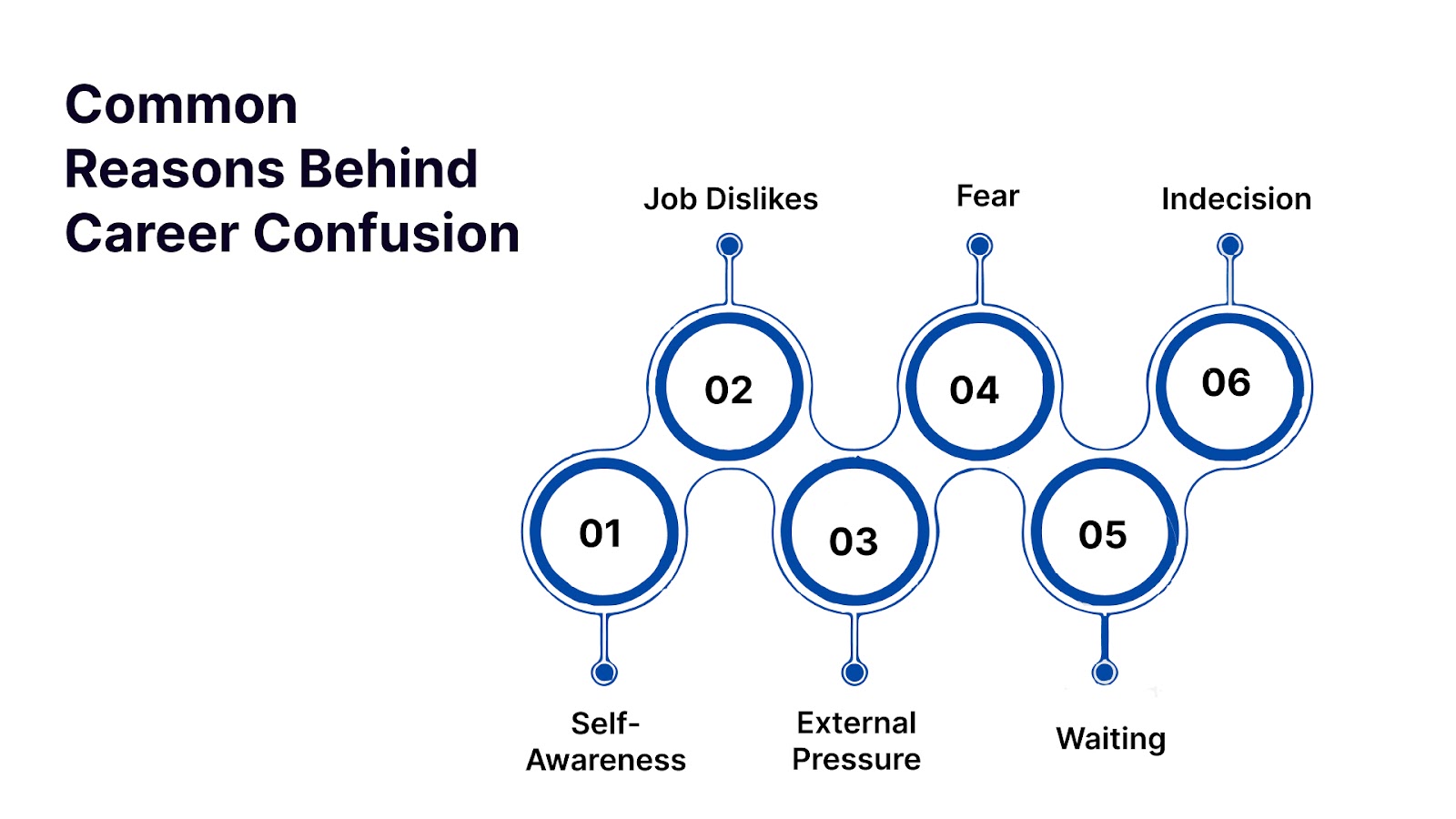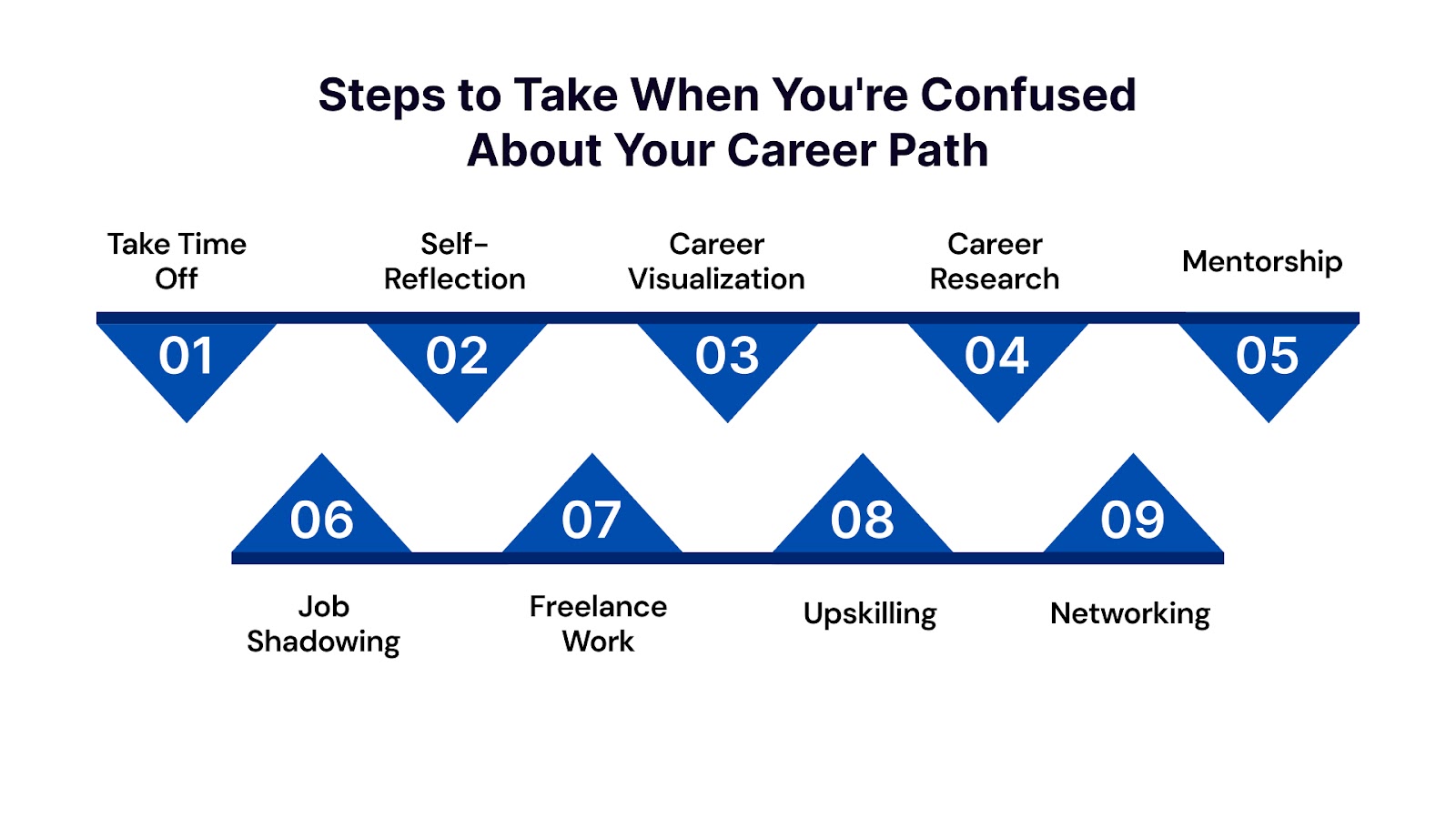July 21, 2025

Have you ever felt that unsettling feeling when your professional life feels more like a maze than a path? You might have a job, even a good one, but it doesn’t feel like it fits. Or perhaps you’re at a crossroads, unsure whether to continue on your current path or pivot entirely.
You’re not alone in feeling overwhelmed. Career confusion is more common than most people realize. Moreover, it’s not confined to 86% of fresh graduates who report being confused about career preferences — it’s something many people face at different stages of their professional lives.
But, why is career confusion so prevalent nowadays? Why are students and working professionals becoming more and more confused about career choices even when there is a clear abundance of options to choose from. The answer might be simpler than you think.
In this comprehensive article, we will guide you through understanding the causes of career confusion, how to navigate through it, and provide actionable steps to help you take control of your career journey.
TL;DR (Key Takeaways)
Career confusion refers to the state of feeling uncertain, overwhelmed, or indecisive about your career path. This can happen when you are unsure about which direction to take, which profession to choose, or whether your current job or career is truly fulfilling. It’s not uncommon to feel lost when you’re unsure about your long-term goals, the steps needed to reach them, or if you’ve made the right decisions in your professional life so far.
Some key indicators of career confusion include frequent self-doubt, anxiety about the future, or even a sense of stagnation. Career confusion often leads to feelings of frustration and indecisiveness, and while it can feel paralyzing, it is also a normal part of career growth.
Now that we've clearly defined career confusion, it's essential to explore the underlying root causes.

Career confusion is very common, especially when faced with important decisions about professional paths. Understanding the root causes behind this uncertainty is your first step in the direction of overcoming it.
Let’s delve into some of the most common factors that contribute to career confusion.
The #1 cause of career confusion is your lack of self-awareness. Not knowing your strengths, weaknesses, interests, and values can make it challenging to select a fulfilling career path. This lack of self-awareness can make you pursue paths that don't align with your true self, resulting in dissatisfaction and confusion. Therefore, becoming more self-aware through introspection and feedback is crucial for navigating career choices effectively.
Often, you put so much focus on what you like about your job that you completely overlook the aspects that you dislike. This oversight can lead to staying in a role that doesn't fulfill you, perpetuating confusion about career direction. Or, you may take up another job role that still doesn’t rectify these things, and again end up confused. Thus, identifying and acknowledging the aspects of your current job that cause dissatisfaction is essential for making informed career decisions.
External pressures from society, family, and peers significantly influence your career decisions. While their intentions may be well-meaning, succumbing to societal expectations, family opinions, and peer comparisons without considering your personal interests often means pursuing careers that don't resonate with your true aspirations. Over time, this too will result in career confusion and lack of fulfillment.
Fear is a powerful emotion that can greatly impact your career choices. Fear of failure, fear of judgment, fear of the unknown, or fear of making the wrong decision can paralyze you and prevent you from taking risks. This anxiety can make you stay in unsatisfactory jobs or hesitate to pursue new opportunities, leading to career stagnation and more confusion about your professional choices.
Sometimes, you too might hold onto the hope that your current job will magically improve over time without taking any proactive steps. You’ll get a promotion, a new manager, better work-life balance, or more fulfilling opportunities, and everything will fall into place. But, that’s hardly ever the case, since this passive approach only leads to prolonged frustration, missed opportunities, and career confusion.
Your career confusion can also be the result of your inability to make decisions. Having an abundance of career options to choose from can overwhelm you very easily and prevent you from deciding anything. Or, you may simply be stuck in a comfort zone in your current job or industry and the fear of change is making you carry on, even when you’re unfulfilled and confused.
By identifying which of these factors are contributing to your career confusion, you can begin to address them and move towards a more fulfilling professional life.
Feeling confused about your career choices? Topmate offers personalized mentorship and career guidance to help you make informed decisions and overcome career confusion,

Next, let’s explore why and how career confusion can manifest itself at different stages of life in different individuals.
Career confusion isn't confined to early adulthood or a single phase of life. It manifests differently at various stages, whether you’re transitioning into the workforce or contemplating a mid-life career change. Knowing when and why this confusion occurs can help you deal with them with confidence and clarity.
Let's explore how career uncertainty presents itself at different ages and how you can navigate through it.
The transition from college to the workforce is a significant milestone. At this stage, you may grapple with deciding whether to pursue higher studies, jump into a job, or take some time off to figure things out.
Challenges:
Actionable Step: It’s best to explore different fields, take internships, and consider freelance opportunities to gain more clarity. Additionally, focus more on building a versatile skill set rather than choosing ‘right’ job.
By the age of 25, you may have had a couple of full-time jobs under your belt. While this may seem like a stable position, you can still experience a ‘quarter-life crisis’ and feel uncertain about whether you’re on the right career path.
Challenges:
Actionable Step: Consider upskilling through professional courses or certifications, and seek guidance from industry experts to gain more insights.
Entering the mid-30s, you have an already-established career but may still feel dissatisfied or unsure about your next steps. You may reflect on your achievements and aspirations and think whether to advance further in your current role or switch careers entirely.
Challenges:
Actionable Step: Reevaluate your goals and assess whether you need to learn new skills or take on a different challenge. You can also implement strategies to balance personal and professional commitments.
By the age of 50, you often possess a wealth of experience. However, at this stage your confusion can stem from thoughts about handling retirement planning, adjusting to changing professional dynamics, or simply the desire to leave a meaningful impact.
Challenges:
Actionable Step: Consider exploring mentorship roles or advisory positions that leverage your experience. You can also engage in charitable activities to create a legacy for yourself.
Now that you understand the unique challenges at each life stage, it's essential to explore actionable steps to take when faced with career uncertainty.

When you're confused about your career path, it can feel overwhelming, but it's a natural phase of professional growth. Though it may feel like a dead end, with a little effort, you can regain control and clarity. All it requires is a bit of exploration, reflection, and proactive action.
Here's a comprehensive guide to help you navigate this phase with clarity and confidence.
Sometimes, the best way to find direction is to step away from the daily grind. A well-planned career break, often called ‘micro-retirement’, can provide the mental space to reflect on your goals without the pressure of daily work life.
This break can help you gain a fresh perspective on your career and future aspirations.
Since understanding yourself is the cornerstone of career clarity, spend time identifying your true passions, talents, and values. Reflect on past experiences to identify patterns in your interests and strengths. Here are some actionable steps you can take:
This self-assessment will guide you in choosing a career path that aligns with your personal interests and strengths.
Visualization is a powerful tool and creating a clear vision for your career path can transform uncertainty into actionable steps. Based on your vision, plan your career path and craft a comprehensive roadmap to outline the steps needed to achieve your goals.
By imagining your future career path, you can create a roadmap to reach your goals.
When you’re confused about your career, the best way to clear the fog is by actively researching your options. Exploring various career options allows you to compare and contrast different fields to find the best fit. Here’s how you can hit the ground running:
Create a comparison chart listing potential careers, required skills, job outlook, and personal interest levels to facilitate easier decision-making.
In times when 90% of students choose wrong careers due to lack of guidance, finding a mentor can unlock invaluable insight and a fresh perspective on your goals. Attend industry events, reach out to alumni networks, or use platforms like Topmate to find your perfect mentor. Here’s how to make the most of mentorship:
It’s best to find a mentor in your industry or field of interest, and set regular meetings to seek guidance from them.
Want expert mentorship to guide your career? Topmate offers personalized career coaching to help you evaluate all your options and make informed decisions.

Sometimes, the best way to decide whether a career is right for you is to experience it firsthand. This offers realistic insights into different roles, industries, and work environments and helps you make informed decisions. Here are a few key approaches to it:
Reach out to professionals in your field on LinkedIn and Topmate to ask for informational interviews or internship opportunities.
Freelancing is another great way to test out a new career path without committing fully. It gives you the flexibility to explore different roles, gain experience, and even earn money while figuring out your endgame. Here’s a little something to get you started:
You can explore platforms like Upwork or Fiverr to find freelance opportunities related to your skills and areas of interest.
Sometimes career confusion arises from feeling underqualified or stagnant in your current position. At this time, upskilling and acquiring additional qualifications can open up new opportunities and provide clarity about your desired paths. Here are some ways you can do that:
A pro-tip is to pursue courses and opt for certifications that are relevant to your field of interest and align with your long-term goals.
When you’re uncertain about your career, one of the best ways to gain clarity is by connecting with others. A strong network opens up career opportunities and unlocks valuable guidance from people who’ve walked a similar path. Here are some strategies you can use:
Regularly engage with the people in your network and approach it with a mindset of building relationships, not just seeking opportunities.
Feeling confused about career is something most people experience at various points in their professional lives. Whether you're just starting out or have been working for years, the journey to finding a fulfilling career isn’t always clear-cut. There's no one-size-fits-all answer and it's perfectly normal to feel uncertain and confused at times.
When taking measures to combat career confusion, Topmate can be your best ally. Our platform can connect you with seasoned experts and career coaches who can offer expert mentorship and guidance tailored specifically to your career stage, interests, and goals to help you get past the confusion and make meaningful progress.
Having navigated similar paths, our mentors are well-equipped to help you with personalized insights into the career direction best suited for you. Whether you need career clarity, guidance on potential career shifts, or a deeper understanding of industry trends, we can support you.
If you’re confused about career choices, don’t wait for the perfect answer to come to you. Schedule your one-on-one call with an expert today and take a proactive step towards gaining clarity.